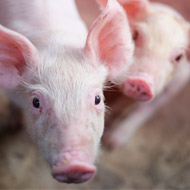Funding boost for foot-and-mouth vaccine consortium

Foot-and-mouth is one of the most economically important infectious diseases of livestock across the world.
An international foot-and-mouth (FMD) vaccine research and development consortium has been awarded more than £3 million of funding from the Wellcome Trust to produce a more affordable and effective vaccine.
The consortium, led by The Pirbright Institute, will use the funding to build on initial research and answer remaining product development challenges. Welcoming the news, Dr Bryan Charleston of the Pirbright Institute said:
“This represents the final step in being able to bring an affordable and effective FMD vaccine to the market that does not require special facilities to produce, is less reliant on a cold chain, and so will transform the livelihood of those farmers in the poorest areas of the world who depend on their livestock for food and economic security.”
FMD is one of the most economically important infectious diseases of livestock across the world, affecting sheep, goats, pigs and other cloven-footed animals.
Initial research into a new vaccine to protect against the disease showed that virus-like particle (VLP) copies of FMD, grown in insect cells, were effective in protecting cattle against four serotypes of the disease. Researchers say the new research aims to translate these findings into a commercially viable vaccine that is effective against multiple strains of FMDV.
Consortium member Ian Jones, professor of virology at the University of Reading, said: “I am very grateful to the Wellcome Trust for their continued support of our research aimed at making vaccination against foot-and-mouth disease virus far more widespread. The basic science has progressed well but there is still a gap in making its manufacture a practical reality, which this funding should allow us to bridge.
“The principles we learn could also benefit other vaccines made in a similar way, for both animal and human disease.”



 The veterinary mental health charity Vetlife is inviting the veterinary community to join it for a sponsored cold-water dip.
The veterinary mental health charity Vetlife is inviting the veterinary community to join it for a sponsored cold-water dip.